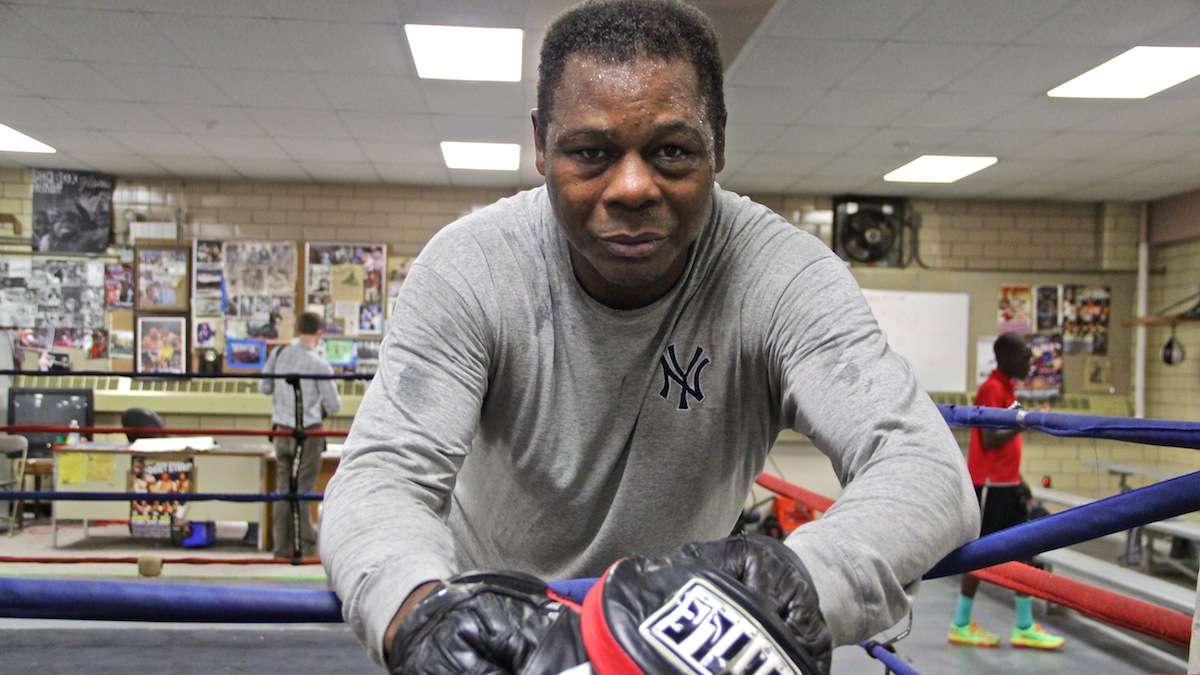First-ever super-heavyweight champion Tyrell Biggs to be featured in upcoming documentary
ListenIn the back corner of a rec center boxing gym, Tyrell Biggs holds his sparring mitts just below his face for 15-year-old Dylan Price.
His bright-white gloves at the ready, Price eyes Biggs for the next set of instructions after landing a combo of jabs.
“Bop, bop, then bop. Two times,” Biggs tells Price while shadow boxing the pattern.
Most weekday afternoons, the West Philadelphia native can be found mentoring aspiring boxers inside Mitchell Allen Boxing Gym, a one-ring basement operation at Sheperd Recreation Center.
Biggs, 52, knows boxing. At one time, he was one of the country’s elite boxers. His career, though, probably doesn’t ring a bell for most.
Telling Biggs’ story
Enter Dafna Yachin, who is co-directing a new documentary about Biggs, who won Olympic gold and competed for the heavyweight belt after bouncing back from addictions to drugs and drinking.
“It’s not your typical, everybody walks away with money and it all works out, but it’s life.” said Yachin. “And so, where do we live in that in between of fame and obscurity and that’s where we’re hoping you’ll still find that glimmer of hope that we always want in everyone’s life.”
“Whatever Happened to Tyrell Biggs,” will tell that story on the big screen if the project, an effort by the Manayunk-based Lunchbox Communications, can secure the final chunk of funding needed to wrap up production — about $35,000. It’s hoped a recently launched Kickstarter campaign will get the approximately $200,000 job done.
Winning the gold
The highlight of Biggs’ career came early. In 1984, at 23, he became the first-ever super-heavyweight gold medalist.
It was, needless to say, a big moment.
“I remember watching the prior Olympics and some of the medalists would say how it’s a feeling you can’t describe. I actually thought that was kind of a cliché — something good to say. But when they called my name and I knew that I won the gold medal, that was really a feeling you can’t describe,” said Biggs.
After the big win, Biggs turned pro and signed up with a high-profile promoter that represented some of the sport’s best at the time, including Evander Holyfield.
As Biggs tells it, the fame, and specifically the money, went to his head. He started abusing drugs and alcohol and quickly hit rock bottom.
“I just went off the deep end and I was to the point where I didn’t know how to stop,” said Biggs.
Biggs spent 30 days in a California rehab facility. Afterwards, boxing helped him to stay clean.
“Boxing being a rough sport as it is, you have to be on top of yourself physically and get into the best shape you can be in and that was a good anchor to go with in order to keep myself together.”
‘A superstar’
Three years after winning Olympic gold, Biggs fought for the heavyweight championship, by far the most important fight of his professional career.
His opponent was Mike Tyson, who, at the time, was the undisputed champion of the world and easily one of the sport’s most aggressive and powerful competitors.
“Probably people didn’t think I’d last two or three rounds,” said Biggs.
It took seven for Tyson to defend his title.
Biggs would never fight for a championship again nor would his star ever shine as bright. He boxed for a while after the Tyson fight, hanging up his gloves for good in 1998.
“We must continue to honor people that do great work no matter what happens,” said Yachin. “We’re all flawed. Everything happens. Nobody is perfect. But Tyrell is a superstar.”
“There’s never going to be another first superheavyweight champion of the world and he deserves his place in this great story and in history and to be embraced by the City of Philadelphia always.”
The “Whatever Happened to Tyrell Biggs?” Kickstarter campaign ends Nov. 25. As of Sunday night, the film had raised $4,027. If their goal is reached, Yachin expects to finish filming by Feburary and begin screening the documentary in the spring.
WHYY is your source for fact-based, in-depth journalism and information. As a nonprofit organization, we rely on financial support from readers like you. Please give today.













